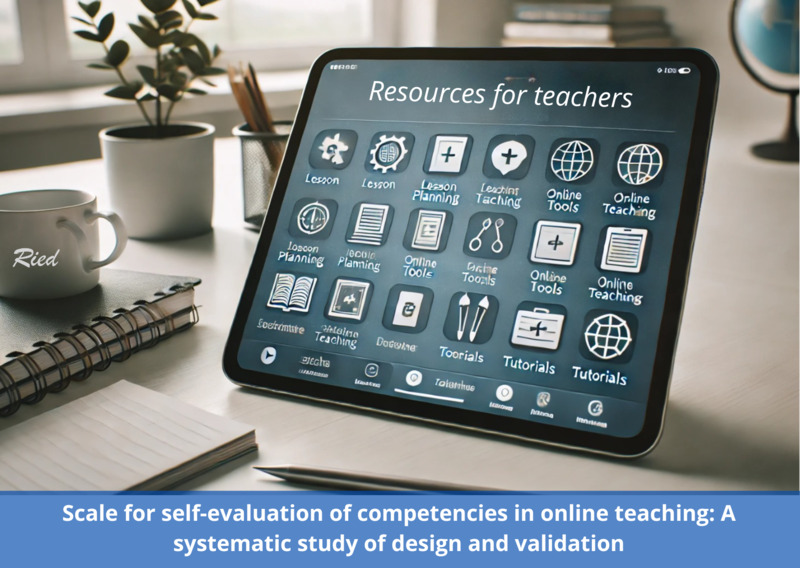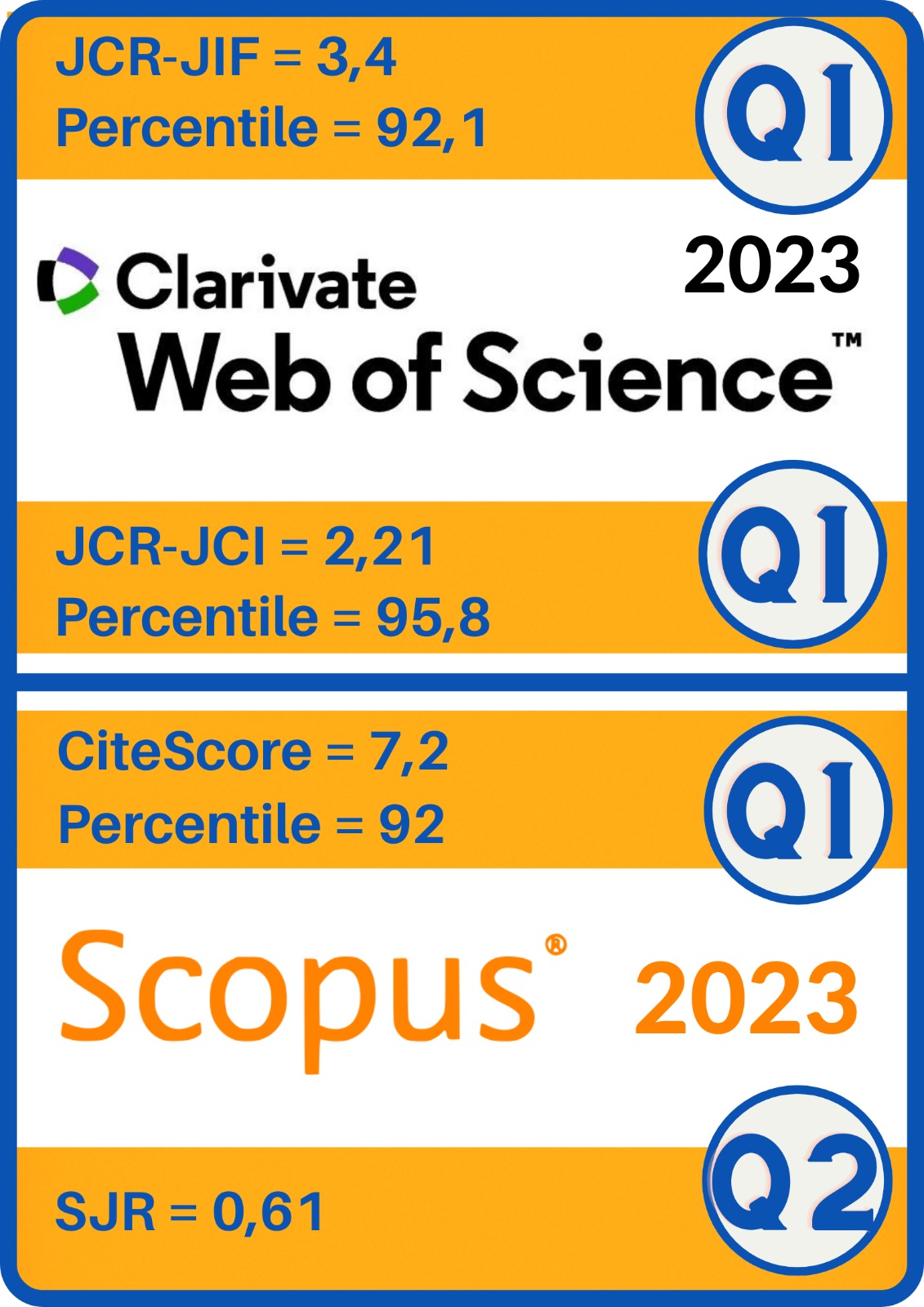Scale for self-evaluation of competencies in online teaching: A systematic study of design and validation
DOI:
https://doi.org/10.5944/ried.28.1.41320Keywords:
evaluation, digital competencies, university teachers, content validity, construct validity, reliabilityAbstract
The Honduran Higher Education System lacks instruments that evaluate various constructs associated with the online teaching modality, which constitute as evaluation models aimed to monitor and assure the quality of higher education in its online teaching modality. Hence, this study was oriented to design an instrument that would gather the required psychometric properties for the valid and reliable measurement of the competencies in online teaching of university professors, during the year 2023. For this purpose, a mixed research approach was used, but with a greater quantitative weight. The sample was non-probabilistic, by convenience and was integrated by 650 university professors from the UNAH, UPNFM and EAP Zamorano. The Scale for self-evaluation of competencies in online teaching (ECODEV) was constructed through a systematic review of the literature under three theoretical factors: pedagogical, technological and course management competences. The findings ratified that the construct under measurement is composed of these factors with a total of 49 items. The factorial model of the ECODEV corresponds to a hierarchical model and it is explained by a total cumulative variance of 0.66, a total Ω of 0.99 and with fit indexes CFI = 0.999, RMSEA = 0.043 and SRMR = 0.045. In conclusion, the ECODEV has a satisfactory psychometric quality and, therefore, provides robust and relevant information about its measurable construct in university teachers in the Honduran context.
Downloads
References
Abad, F. J., Olea, J., Ponsoda, V., & García, C. (2011). Medición en ciencias sociales y de la salud. Editorial Síntesis.
Albrahim, F. (2020). Online Teaching Skills and Competencies. TOJET: The Turkish Online Journal of Educational Technology, 19(1), 9-20.
Cadena, L. A., & Ramos, L. L. (2023). Pandemia y educación superior en América Latina. Revista de la Educación Superior, 52(205), 1-20. https://doi.org/10.36857/resu.2023.205.2367
Carbonell, C. E., Rodríguez, R., Sosa, L. A., & Alva, M. A. (2021). De la educación a distancia en pandemia a la modalidad hibrida en pospandemia. Revista Venezolana de Gerencia, 26(96), 1154-1171. https://doi.org/10.52080/rvgluz.26.96.10
Dirección de Educación Superior (DES). (14 de agosto de 2014). Reglamento de la Educación a Distancia en el Nivel de Educación Superior de Honduras. Acuerdo n° 2572-264-2012. DO: La Gaceta.
Elosua, P., Aguado, D., Fonseca-Pedrero, E., Abad, F. J., & Santamaría, P. (2023). New Trends in Digital Technology-Based Psychological and Educational Assessment. Psicothema, 35(1), 50-57. https://doi.org/10.7334/psicothema2022.241
Farmer, H., & Ramsdale, J. (2016). Teaching Competencies for the Online Environment. Canadian Journal of Learning and Technology, 42(3), 1-17. https://doi.org/10.21432/T2V32J
Ferrando, P. J., Lorenzo-Seva, U., Hernández-Dorado, A., & Muñiz, J. (2022). Decálogo para el Análisis Factorial de los Ítems de un Test. Psicothema, 34(1), 7-17. https://doi.org/10.7334/psicothema2021.456
Flora, D. B. (2020). Your Coefficient Alpha Is Probably Wrong, but Which Coefficient Omega Is Right? A Tutorial on Using R to Obtain Better Reliability Estimates. Advances in Methods and Practices in Psychological Science, 3(4), 484-501. https://doi.org/10.1177/2515245920951747
Garcia-Pardina, A., Abad, F. J., Christensen, A. P., Golino, H., & Garrido, L. E. (2024). Dimensionality assessment in the presence of wording effects: A network psychometric and factorial approach. Behavior Research Methods. https://doi.org/10.3758/s13428-024-02348-w
Grieder, S., & Steiner, M. D. (2021). Algorithmic jingle jungle: A comparison of implementations of principal axis factoring and promax rotation in R and SPSS. Behavior Research Methods, 54, 54-74. https://doi.org/10.3758/s13428-021-01581-x
Instituto Nacional de Estadística. (2019). LXV Encuesta Permanente de Hogares de Propósitos Múltiples. Junio del 2019.
Instituto Nacional de Estadística. (2023). LXXVII Encuesta Permanente de Hogares de Propósitos Múltiples. Junio de 2023.
International Commission on the Futures of Education. (2020). Education in a post-COVID world: Nine ideas for public action. UNESCO.
Izquierdo, I., Olea, J., & Abad, F. (2014). Exploratory factor analysis in validation studies: Uses and recommendations. Psicothema, 26(3), 395-400. https://doi.org/10.7334/psicothema2013.349
Lloret-Segura, S., Ferreres-Traver, A., Hernández-Baeza, A., & Tomás-Marco, I. (2014). El Análisis Factorial Exploratorio de los Ítems: una guía práctica, revisada y actualizada. Anales de Psicología, 30(3), 1151-1169. https://doi.org/10.6018/analesps.30.3.199361
Meinck, S., Fraillon, J., & Strietholt, R. (Eds.) (2022). The impact of the COVID-19 pandemic on education. UNESCO.
Mullo, H., & Marcatoma, J. (2022). Introducción a la Psicometría y Estadística. Editorial Grupo Compás.
Muñiz, J., & Fonseca-Pedrero, E. (2019). Diez pasos para la construcción de un test. Psicothema, 31(1), 7-16. https://doi.org/10.7334/psicothema2018.291
Organization for Economic Cooperation and Development. (2021). The State of Higher Education: One Year into the COVID-19 Pandemic. OECD Publishing. https://doi.org/10.1787/83c41957-en
Quintanilla, M. (2016). La educación superior a distancia y virtual en Honduras: avances y desafíos. In M. Cruz & C. Rama (Eds.), La educación a distancia y virtual en Centroamérica y El Caribe (pp. 71-91). Ediciones UAPA.
Rico-Reintsch, K. I. (2019). Uso de autoevaluación docente como herramienta innovadora para el mejoramiento de las asignaturas universitarias. Revista CEA, 5(10), 69-81. https://doi.org/10.22430/24223182.1445
Rigo, D. Y., & Donolo, D. (2019). Modelos de ecuaciones estructurales usos en investigación psicológica y educativa. Revista Interamericana de Psicología, 52(3), 345-357. https://doi.org/10.30849/ripijp.v52i3.388
UNESCO. (2017). La Educación superior virtual en América Latina y El Caribe. UNESCO IESALC.
Universidad Nacional Autónoma de Honduras. (2009). Modelo Educativo de la Universidad Nacional Autónoma de Honduras. Serie de Publicaciones de la Reforma Universitaria No. 3.
Universidad Nacional Autónoma de Honduras. (2014). La Educación a Distancia en la Universidad Nacional Autónoma de Honduras. Serie de Publicaciones de la Reforma Universitaria No. 5.
Universidad Nacional Autónoma de Honduras. (2021). Anuario Estadístico N° 51.
Universidad Pedagógica Nacional Francisco Morazán. (2022). Memoria Estadística UPNFM 2022.
Ventura-León, J., & Caycho-Rodríguez, T. (2017). El coeficiente Omega: un método alternativo para la estimación de la confiabilidad. Revista Latinoamericana de Ciencias Sociales, Niñez y Juventud, 15(1), 625-627.
Yusoff, M. (2019). ABC of content validation and content validity index calculation. Education in Medicine Journal, 11(2), 49-54. https://doi.org/10.21315/eimj2019.11.2.6

Downloads
Published
How to Cite
Issue
Section
License
Copyright (c) 2024 Maynor Noel Reyes-Vásquez

This work is licensed under a Creative Commons Attribution 4.0 International License.
The articles that are published in this journal are subject to the following terms:
1. The authors grant the exploitation rights of the work accepted for publication to RIED, guarantee to the journal the right to be the first publication of research understaken and permit the journal to distribute the work published under the license indicated in point 2.
2. The articles are published in the electronic edition of the journal under a Creative Commons Attribution 4.0 International (CC BY 4.0) license. You can copy and redistribute the material in any medium or format, adapt, remix, transform, and build upon the material for any purpose, even commercially. You must give appropriate credit, provide a link to the license, and indicate if changes were made. You may do so in any reasonable manner, but not in any way that suggests the licensor endorses you or your use.
3. Conditions for self-archiving. Authors are encouraged to disseminate electronically the OnlineFirst version (assessed version and accepted for publication) of its articles before publication, always with reference to its publication by RIED, favoring its circulation and dissemination earlier and with this a possible increase in its citation and reach among the academic community.







